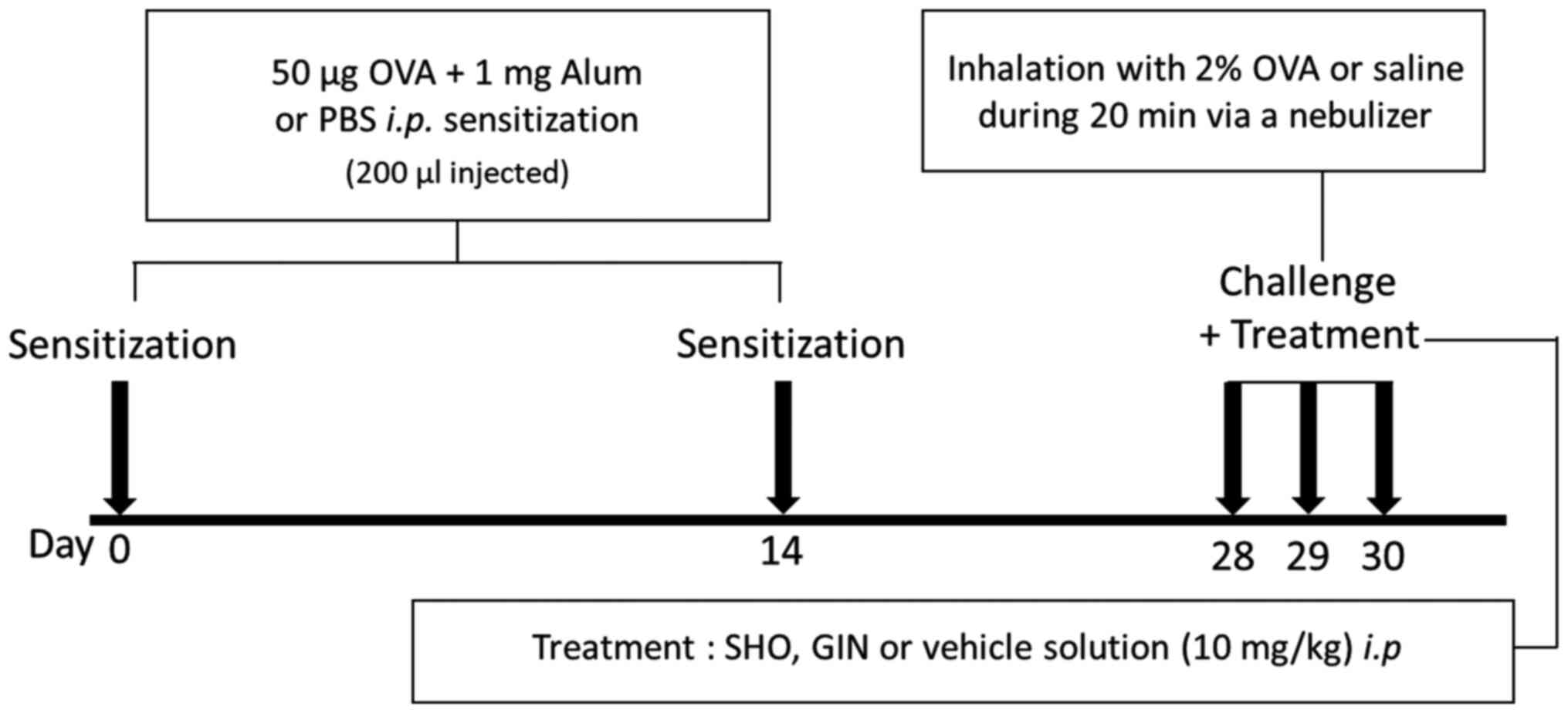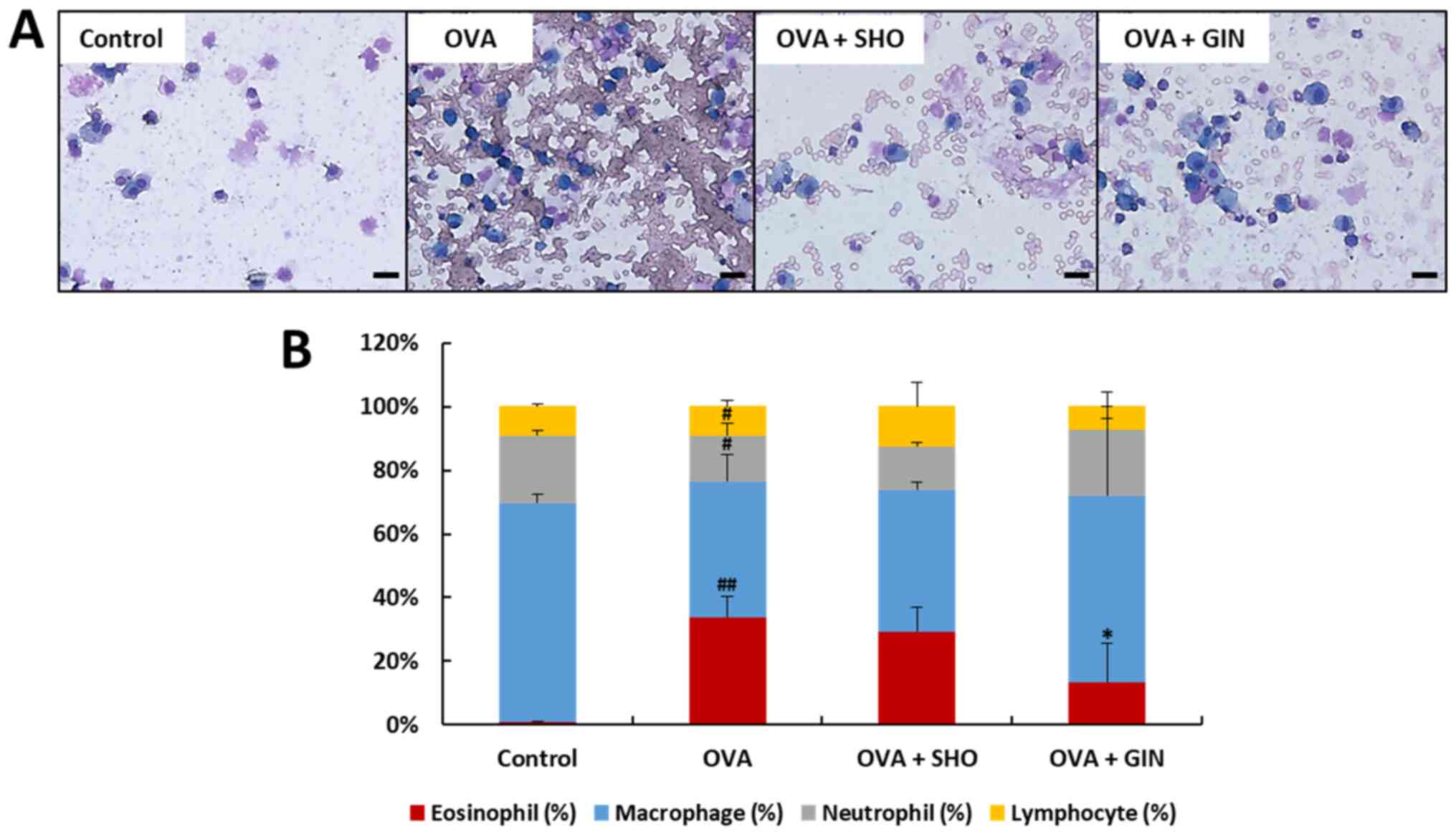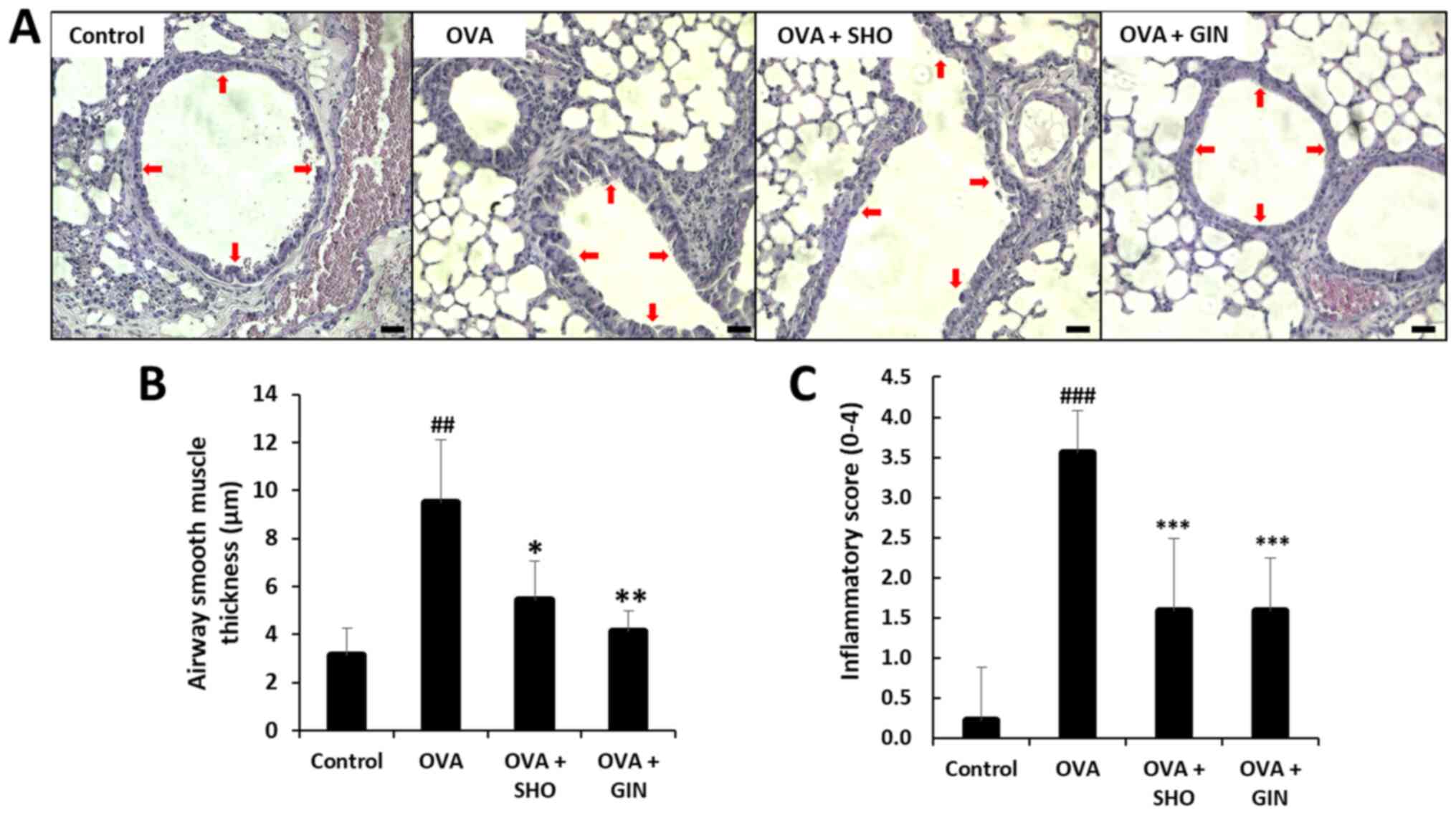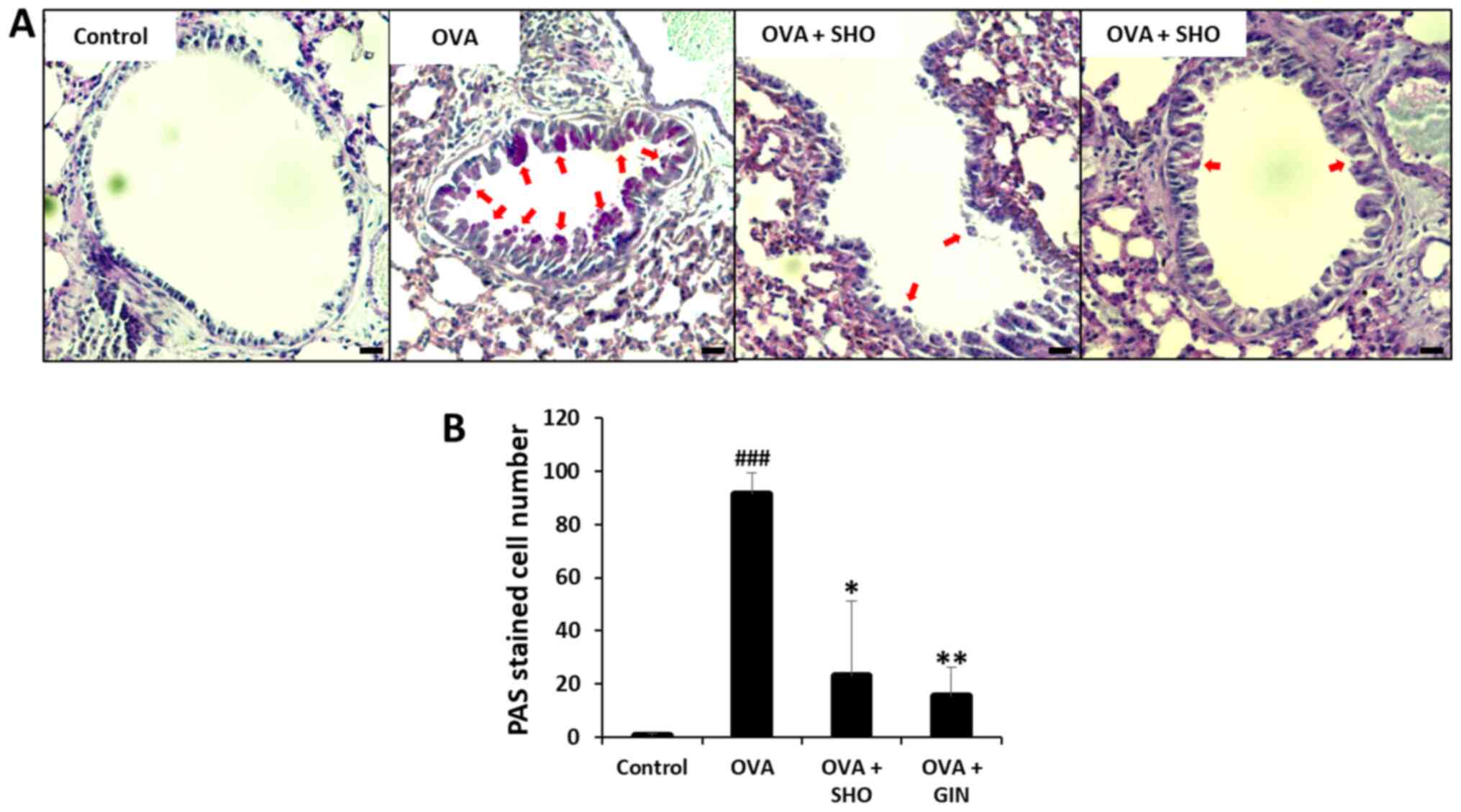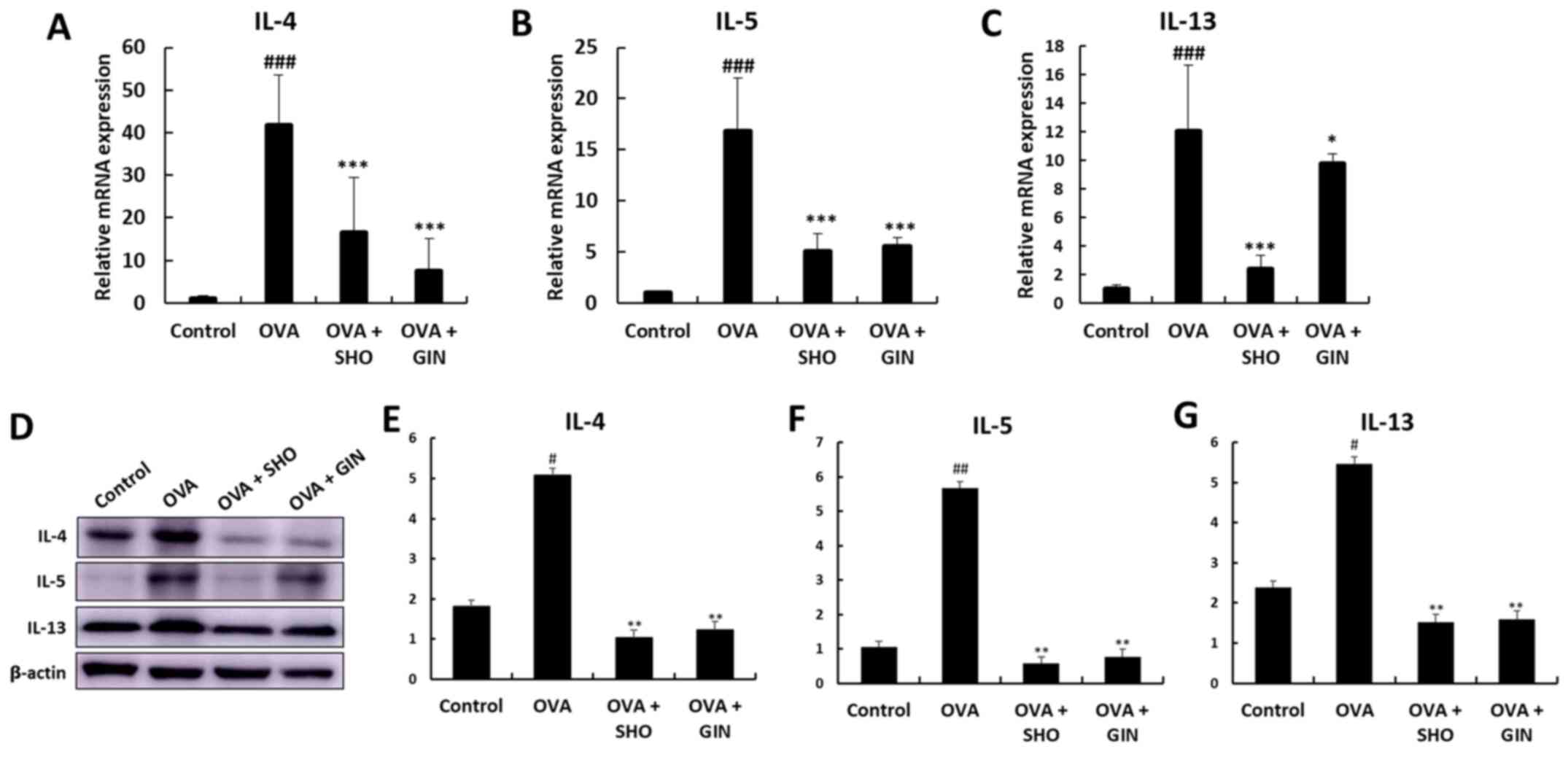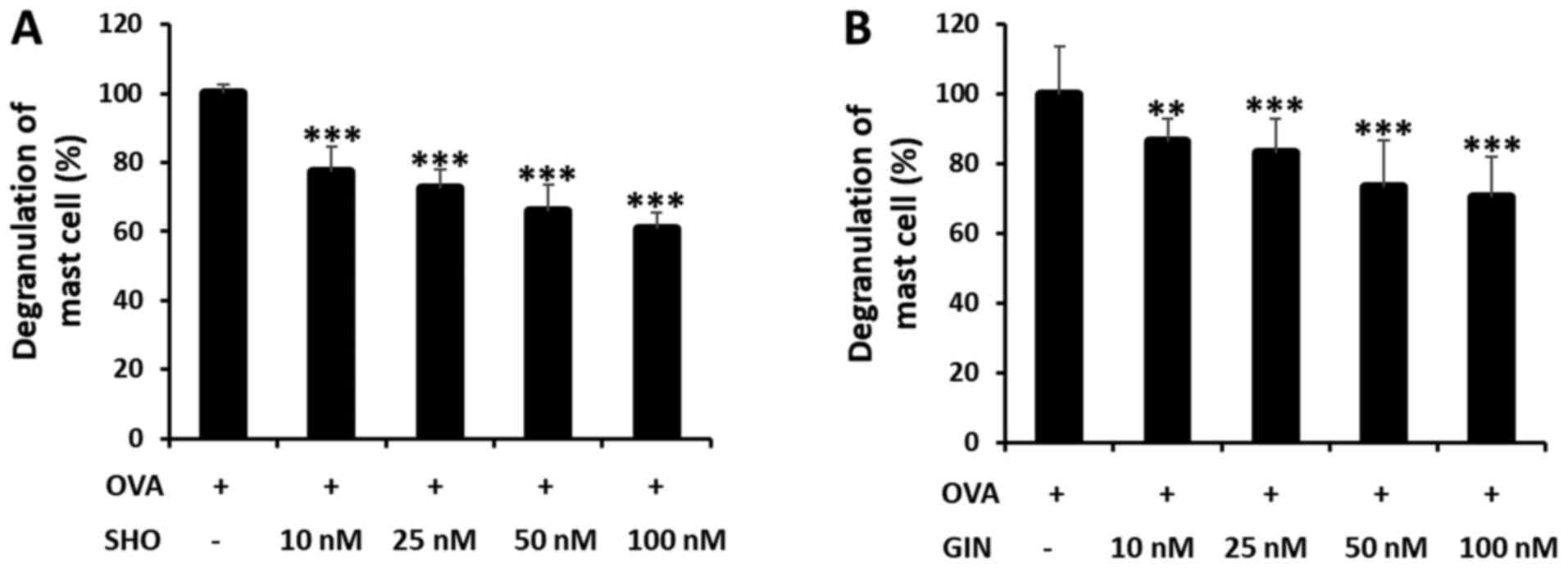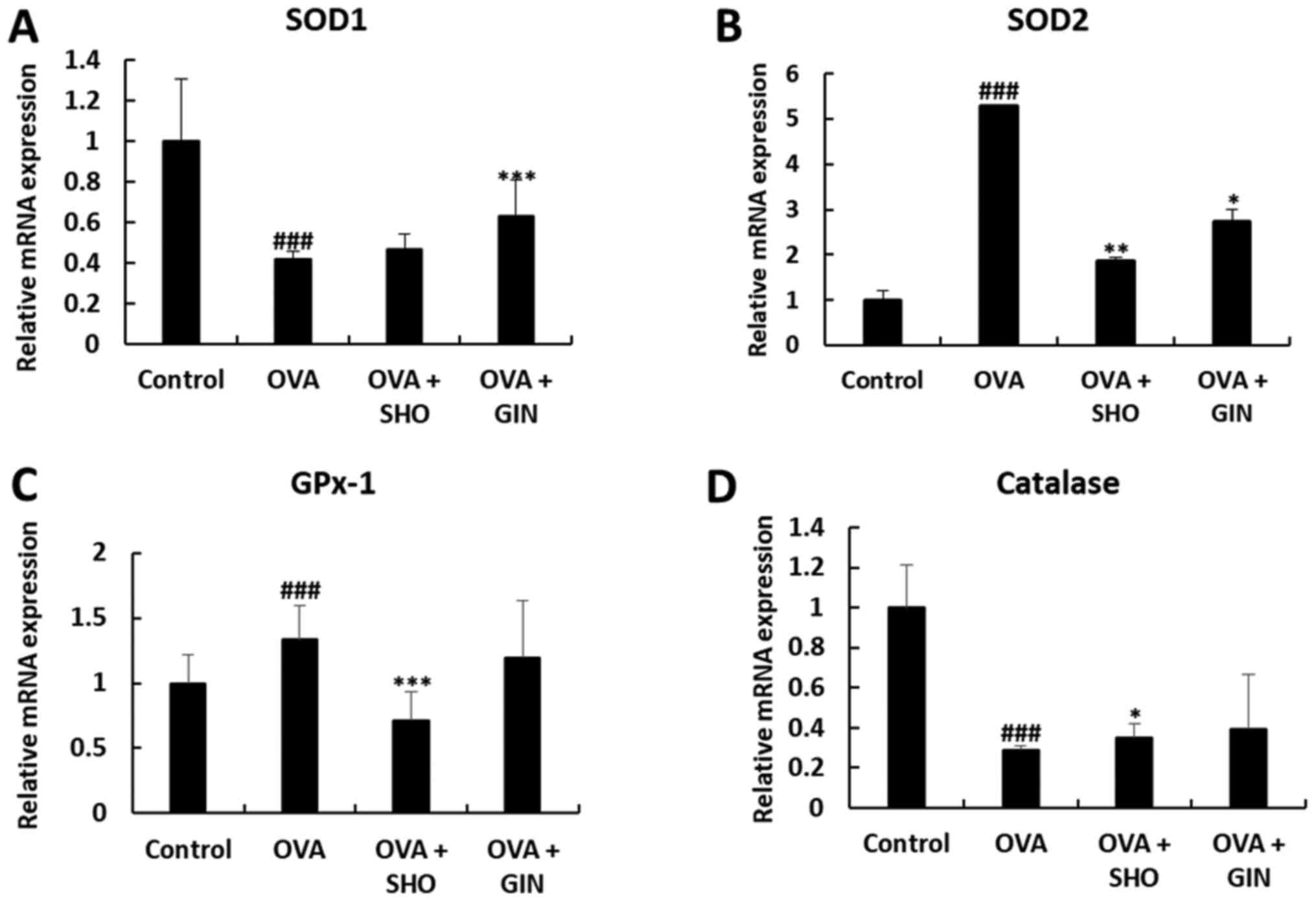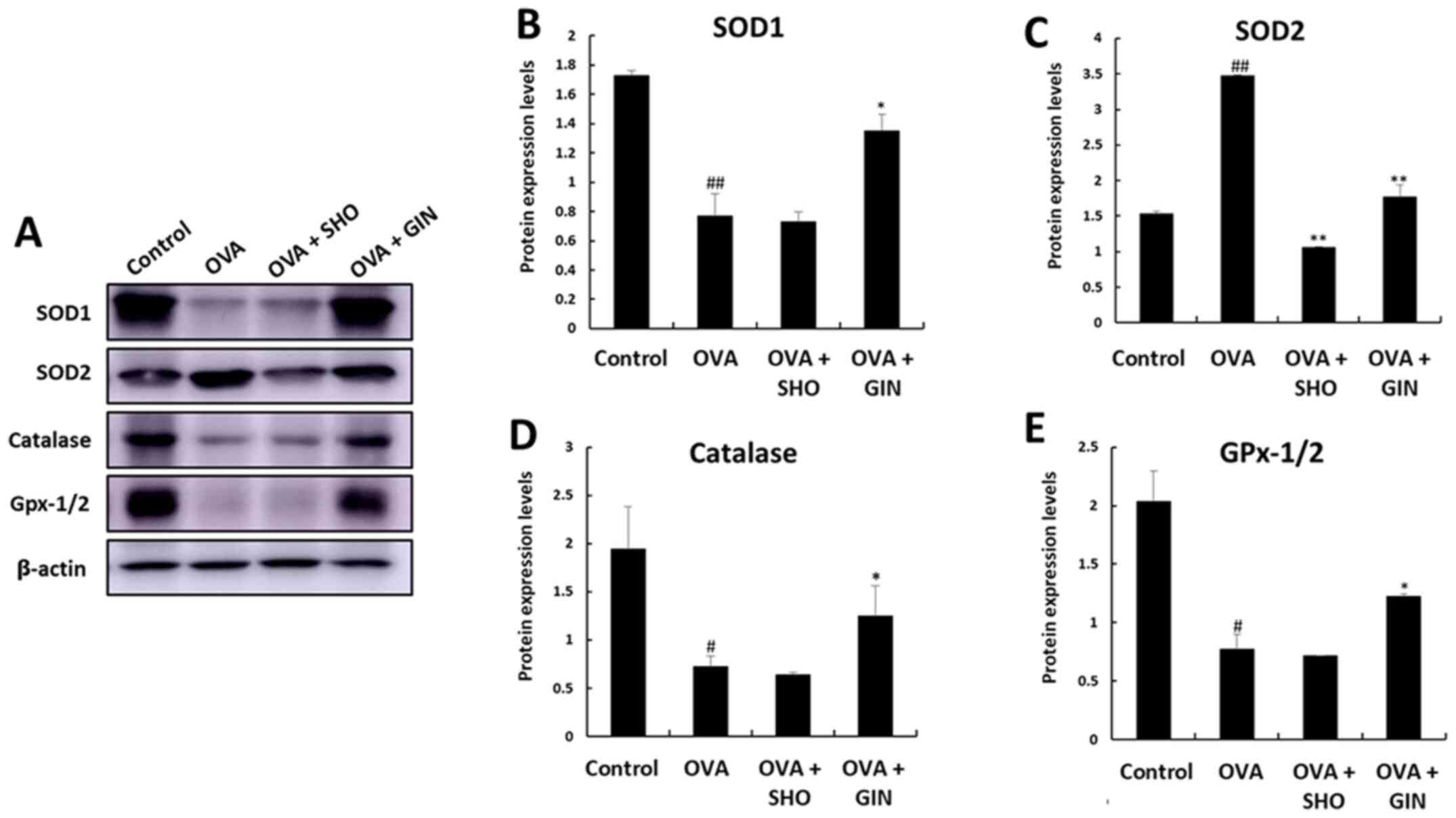|
1
|
Okuyama K, Ohwada K, Sakurada S, Sato N,
Sora I, Tamura G, Takayanagi M and Ohno I: The distinctive effects
of acute and chronic psychological stress on airway inflammation in
a murine model of allergic asthma. Allergol Int. 56:29–35.
2007.PubMed/NCBI View Article : Google Scholar
|
|
2
|
Meyer EH, DeKruyff RH and Umetsu DT: T
cells and NKT cells in the pathogenesis of asthma. Annu Rev Med.
59:281–292. 2008.PubMed/NCBI View Article : Google Scholar
|
|
3
|
Zhang J, Li C and Guo S: Effects of
inhaled inactivated Mycobacterium phlei on airway inflammation in
mouse asthmatic models. J Aerosol Med Pulm Drug Deliv. 25:96–103.
2012.PubMed/NCBI View Article : Google Scholar
|
|
4
|
O'Garra A: Commitment factors for T helper
cells. Curr Biol. 10:R492–R494. 2000.PubMed/NCBI View Article : Google Scholar
|
|
5
|
Williams AS, Eynott PR, Leung SY, Nath P,
Jupp R, De Sanctis GT, Resnick R, Adcock IM and Chung KF: Role of
cathepsin S in ozone-induced airway hyperresponsiveness and
inflammation. Pulm Pharmacol Ther. 22:27–32. 2009.PubMed/NCBI View Article : Google Scholar
|
|
6
|
Walker JA and McKenzie AN: TH2 cell
development and function. Nat Rev Immunol. 18:121–133.
2018.PubMed/NCBI View Article : Google Scholar
|
|
7
|
Asano T, Kume H, Taki F, Ito S and
Hasegawa Y: Thalidomide attenuates airway hyperresponsiveness and
eosinophilic inflammation in a murine model of allergic asthma.
Biol Pharm Bull. 33:1028–1032. 2010.PubMed/NCBI View Article : Google Scholar
|
|
8
|
Heo JY and Im DS: Anti-allergic effects of
salvianolic acid A and tanshinone IIA from Salvia miltiorrhiza
determined using in vivo and in vitro experiments. Int
Immunopharmacol. 67:69–77. 2019.PubMed/NCBI View Article : Google Scholar
|
|
9
|
Ishii T, Niikura Y, Kurata K, Muroi M,
Tanamoto K, Nagase T, Sakaguchi M and Yamashita N: Time-dependent
distinct roles of Toll-like receptor 4 in a house dust mite-induced
asthma mouse model. Scand J Immunol. 87(e12641)2018.PubMed/NCBI View Article : Google Scholar
|
|
10
|
White MC, Etzel RA, Wilcox WD and Lloyd C:
Exacerbations of childhood asthma and ozone pollution in Atlanta.
Environ Res. 65:56–68. 1994.PubMed/NCBI View Article : Google Scholar
|
|
11
|
Perez L, Declercq C, Iñiguez C, Aguilera
I, Badaloni C, Ballester F, Bouland C, Chanel O, Cirarda FB,
Forastiere F, et al: Chronic burden of near-roadway traffic
pollution in 10 European cities (APHEKOM network). Eur Respir J.
42:594–605. 2013.PubMed/NCBI View Article : Google Scholar
|
|
12
|
Norris G, YoungPong SN, Koenig JQ, Larson
TV, Sheppard L and Stout JW: An association between fine particles
and asthma emergency department visits for children in Seattle.
Environ Health Perspect. 107:489–493. 1999.PubMed/NCBI View Article : Google Scholar
|
|
13
|
Barnett AG, Williams GM, Schwartz J,
Neller AH, Best TL, Petroeschevsky AL and Simpson RW: Air pollution
and child respiratory health: A case-crossover study in Australia
and New Zealand. Am J Respir Crit Care Med. 171:1272–1278.
2005.PubMed/NCBI View Article : Google Scholar
|
|
14
|
Lipworth BJ: Clinical pharmacology of
corticosteroids in bronchial asthma. Pharmacol Ther. 58:173–209.
1993.PubMed/NCBI View Article : Google Scholar
|
|
15
|
Bjermer L and Diamant Z: Current and
emerging nonsteroidal anti-inflammatory therapies targeting
specific mechanisms in asthma and allergy. Treat Respir Med.
3:235–246. 2004.PubMed/NCBI View Article : Google Scholar
|
|
16
|
Oray M, Abu Samra K, Ebrahimiadib N, Meese
H and Foster CS: Long-term side effects of glucocorticoids. Expert
Opin Drug Saf. 15:457–465. 2016.PubMed/NCBI View Article : Google Scholar
|
|
17
|
Lee BK, Park SJ, Nam SY, Kang S, Hwang J,
Lee SJ and Im DS: Anti-allergic effects of sesquiterpene lactones
from Saussurea costus (Falc.) Lipsch. determined using in
vivo and in vitro experiments. J Ethnopharmacol. 213:256–261.
2018.PubMed/NCBI View Article : Google Scholar
|
|
18
|
Liu YN, Zha WJ, Ma Y, Chen FF, Zhu W, Ge
A, Zeng XN and Huang M: Galangin attenuates airway remodelling by
inhibiting TGF-β1-mediated ROS generation and MAPK/Akt
phosphorylation in asthma. Sci Rep. 5(11758)2015.PubMed/NCBI View Article : Google Scholar
|
|
19
|
Grzanna R, Lindmark L and Frondoza CG:
Ginger - an herbal medicinal product with broad anti-inflammatory
actions. J Med Food. 8:125–132. 2005.PubMed/NCBI View Article : Google Scholar
|
|
20
|
Prasad S and Tyagi AK: Ginger and its
constituents: Role in prevention and treatment of gastrointestinal
cancer. Gastroenterol Res Pract. 2015(142979)2015.PubMed/NCBI View Article : Google Scholar
|
|
21
|
Kawamoto Y, Ueno Y, Nakahashi E, Obayashi
M, Sugihara K, Qiao S, Iida M, Kumasaka MY, Yajima I, Goto Y, et
al: Prevention of allergic rhinitis by ginger and the molecular
basis of immunosuppression by 6-gingerol through T cell
inactivation. J Nutr Biochem. 27:112–122. 2016.PubMed/NCBI View Article : Google Scholar
|
|
22
|
Yocum GT, Hwang JJ, Mikami M, Danielsson
J, Kuforiji AS and Emala CW: Ginger and its bioactive component
6-shogaol mitigate lung inflammation in a murine asthma model. Am J
Physiol Lung Cell Mol Physiol. 318:L296–L303. 2020.PubMed/NCBI View Article : Google Scholar
|
|
23
|
Livak KJ and Schmittgen TD: Analysis of
relative gene expression data using real-time quantitative PCR and
the 2(-Delta Delta C(T)) method. Methods. 25:402–408.
2001.PubMed/NCBI View Article : Google Scholar
|
|
24
|
Shi H, Qin S, Huang G, Chen Y, Xiao C, Xu
H, Liang G, Xie Z, Qin X, Wu J, et al: Infiltration of eosinophils
into the asthmatic airways caused by interleukin 5. Am J Respir
Cell Mol Biol. 16:220–224. 1997.PubMed/NCBI View Article : Google Scholar
|
|
25
|
Deo SS, Mistry KJ, Kakade AM and Niphadkar
PV: Role played by Th2 type cytokines in IgE mediated allergy and
asthma. Lung India. 27:66–71. 2010.PubMed/NCBI View Article : Google Scholar
|
|
26
|
Barnes PJ: Th2 cytokines and asthma: An
introduction. Respir Res. 2:64–65. 2001.PubMed/NCBI View
Article : Google Scholar
|
|
27
|
Sahiner UM, Birben E, Erzurum S, Sackesen
C and Kalayci Ö: Oxidative stress in asthma: Part of the puzzle.
Pediatr Allergy Immunol. 29:789–800. 2018.PubMed/NCBI View Article : Google Scholar
|
|
28
|
Powell CV, Nash AA, Powers HJ and Primhak
RA: Antioxidant status in asthma. Pediatr Pulmono. 18:34–38.
1994.PubMed/NCBI View Article : Google Scholar
|
|
29
|
Ahmad A, Shameem M and Husain Q: Relation
of oxidant-antioxidant imbalance with disease progression in
patients with asthma. Ann Thorac Med. 7:226–232. 2012.PubMed/NCBI View Article : Google Scholar
|
|
30
|
Kumar RK, Herbert C and Foster PS: The
‘classical’ ovalbumin challenge model of asthma in mice. Curr Drug
Targets. 9:485–494. 2008.PubMed/NCBI View Article : Google Scholar
|
|
31
|
Park G, Kim HG, Ju MS, Ha SK, Park Y, Kim
SY and Oh MS: 6-Shogaol, an active compound of ginger, protects
dopaminergic neurons in Parkinson's disease models via
anti-neuroinflammation. Acta Pharmacol Sin. 34:1131–1139.
2013.PubMed/NCBI View Article : Google Scholar
|
|
32
|
Kim MO, Lee MH, Oi N, Kim SH, Bae KB,
Huang Z, Kim DJ, Reddy K, Lee SY, Park SJ, et al: [6]-shogaol
inhibits growth and induces apoptosis of non-small cell lung cancer
cells by directly regulating Akt1/2. Carcinogenesis. 35:683–691.
2014.PubMed/NCBI View Article : Google Scholar
|
|
33
|
Bogaert P, Tournoy KG, Naessens T and
Grooten J: Where asthma and hypersensitivity pneumonitis meet and
differ: Noneosinophilic severe asthma. Am J Pathol. 174:3–13.
2009.PubMed/NCBI View Article : Google Scholar
|
|
34
|
Brussino L, Heffler E, Bucca C, Nicola S
and Rolla G: Eosinophils target therapy for severe asthma: Critical
points. Biomed Res Int: Oct 25, 2018 (Epub ahead of print). doi:
10.1155/2018/7582057.
|
|
35
|
Patadia MO, Murrill LL and Corey J:
Asthma: Symptoms and presentation. Otolaryngol Clin North Am.
47:23–32. 2014.PubMed/NCBI View Article : Google Scholar
|
|
36
|
Silveira JS, Antunes GL, Kaiber DB, da
Costa MS, Marques EP, Ferreira FS, Gassen RB, Breda RV, Wyse ATS,
Pitrez P, et al: Reactive oxygen species are involved in eosinophil
extracellular traps release and in airway inflammation in asthma. J
Cell Physiol. 234:23633–23646. 2019.PubMed/NCBI View Article : Google Scholar
|
|
37
|
Fahy JV and Dickey BF: Airway mucus
function and dysfunction. N Engl J Med. 363:2233–2247.
2010.PubMed/NCBI View Article : Google Scholar
|
|
38
|
Woodruff PG, Modrek B, Choy DF, Jia G,
Abbas AR, Ellwanger A, Koth LL, Arron JR and Fahy JV: T-helper type
2-driven inflammation defines major subphenotypes of asthma. Am J
Respir Crit Care Med. 180:388–395. 2009.PubMed/NCBI View Article : Google Scholar
|
|
39
|
Wills-Karp M, Luyimbazi J, Xu X, Schofield
B, Neben TY, Karp CL and Donaldson DD: Interleukin-13: Central
mediator of allergic asthma. Science. 282:2258–2261.
1998.PubMed/NCBI View Article : Google Scholar
|
|
40
|
Lambrecht BN, Hammad H and Fahy JV: The
cytokines of asthma. Immunity. 50:975–991. 2019.PubMed/NCBI View Article : Google Scholar
|
|
41
|
Tavernier J, Plaetinck G, Guisez Y, van
der Heyden J, Kips J, Peleman R and Devos R: The role of
interleukin 5 in the production and function of eosinophils. In:
Hematopoietic cell Growth Factors and their Receptors. Whetton AD
and Gordon J (eds). Plenum Press, New York, NY, pp321-361,
1996.
|
|
42
|
Kips JC: Cytokines in asthma. Eur Respir J
Suppl. 34:24s–33s. 2001.PubMed/NCBI View Article : Google Scholar
|
|
43
|
Debeuf N, Haspeslagh E, van Helden M,
Hammad H and Lambrecht BN: Mouse models of asthma. Curr Protoc
Mouse Biol. 6:169–184. 2016.PubMed/NCBI View
Article : Google Scholar
|
|
44
|
Dabbagh K, Takeyama K, Lee HM, Ueki IF,
Lausier JA and Nadel JA: IL-4 induces mucin gene expression and
goblet cell metaplasia in vitro and in vivo. J Immunol.
162:6233–6237. 1999.PubMed/NCBI
|
|
45
|
Trautmann A, Krohne G, Bröcker EB and
Klein CE: Human mast cells augment fibroblast proliferation by
heterotypic cell-cell adhesion and action of IL-4. J Immunol.
160:5053–5057. 1998.PubMed/NCBI
|
|
46
|
Wills-Karp M, Luyimbazi J, Xu X, Schofield
B, Neben TY, Karp CL and Donaldson DD: Interleukin-13: Central
mediator of allergic asthma. Science. 282:2258–2261.
1998.PubMed/NCBI View Article : Google Scholar
|
|
47
|
Gour N and Wills-Karp M: IL-4 and IL-13
signaling in allergic airway disease. Cytokine. 75:68–78.
2015.PubMed/NCBI View Article : Google Scholar
|
|
48
|
Matucci A, Maggi E and Vultaggio A:
Eosinophils, the IL-5/IL-5Rα axis, and the biologic effects of
benralizumab in severe asthma. Respir Med.
160(105819)2019.PubMed/NCBI View Article : Google Scholar
|
|
49
|
Bradding P, Walls AF and Holgate ST: The
role of the mast cell in the pathophysiology of asthma. J Allergy
Clin Immunol. 117:1277–1284. 2006.PubMed/NCBI View Article : Google Scholar
|
|
50
|
Tomasiak MM, Tomasiak M, Zietkowski Z,
Skiepko R and Bodzenta-Lukaszyk A: N-acetyl-beta-hexosaminidase
activity in asthma. Int Arch Allergy Immunol. 146:133–137.
2008.PubMed/NCBI View Article : Google Scholar
|
|
51
|
Mishra V, Banga J and Silveyra P:
Oxidative stress and cellular pathways of asthma and inflammation:
Therapeutic strategies and pharmacological targets. Pharmacol Ther.
181:169–182. 2018.PubMed/NCBI View Article : Google Scholar
|
|
52
|
Erzurum SC: New insights in oxidant
biology in asthma. Ann Am Thorac Soc. (Suppl 1): 13:S35–S9.
2016.PubMed/NCBI View Article : Google Scholar
|
|
53
|
Comhair SA and Erzurum SC: Redox control
of asthma: Molecular mechanisms and therapeutic opportunities.
Antioxid Redox Signal. 12:93–124. 2010.PubMed/NCBI View Article : Google Scholar
|
|
54
|
Dugasani S, Pichika MR, Nadarajah VD,
Balijepalli MK, Tandra S and Korlakunta JN: Comparative antioxidant
and anti-inflammatory effects of [6]-gingerol, [8]-gingerol,
[10]-gingerol and [6]-shogaol. J Ethnopharmacol. 127:515–520.
2010.PubMed/NCBI View Article : Google Scholar
|
|
55
|
Chen F, Tang Y, Sun Y, Veeraraghavan VP,
Mohan SK and Cui C: 6-shogaol, a active constiuents of ginger
prevents UVB radiation mediated inflammation and oxidative stress
through modulating NrF2 signaling in human epidermal keratinocytes
(HaCaT cells). J Photochem Photobiol B. 197(111518)2019.PubMed/NCBI View Article : Google Scholar
|
|
56
|
Na JY, Song K, Lee JW, Kim S and Kwon J:
Pretreatment of 6-shogaol attenuates oxidative stress and
inflammation in middle cerebral artery occlusion-induced mice. Eur
J Pharmacol. 788:241–247. 2016.PubMed/NCBI View Article : Google Scholar
|
|
57
|
Chakraborty D, Mukherjee A, Sikdar S, Paul
A, Ghosh S and Khuda-Bukhsh AR: [6]-Gingerol isolated from ginger
attenuates sodium arsenite induced oxidative stress and plays a
corrective role in improving insulin signaling in mice. Toxicol
Lett. 210:34–43. 2012.PubMed/NCBI View Article : Google Scholar
|
|
58
|
Koussounadis A, Langdon SP, Um IH,
Harrison DJ and Smith VA: Relationship between differentially
expressed mRNA and mRNA-protein correlations in a xenograft model
system. Sci Rep. 5(10775)2015.PubMed/NCBI View Article : Google Scholar
|
|
59
|
Fortelny N, Overall CM, Pavlidis P and
Freue GV: Can we predict protein from mRNA levels? Nature.
547:E19–E20. 2017.PubMed/NCBI View Article : Google Scholar
|















